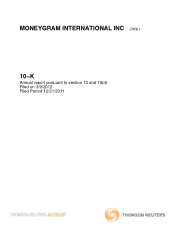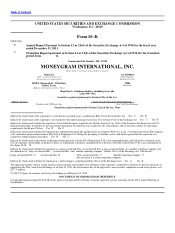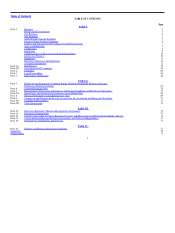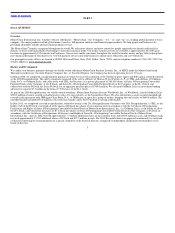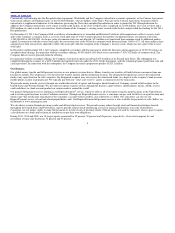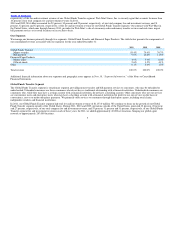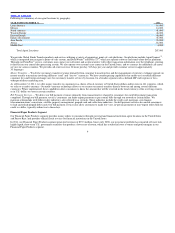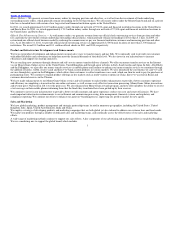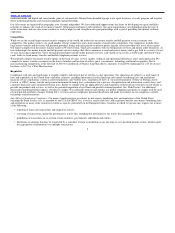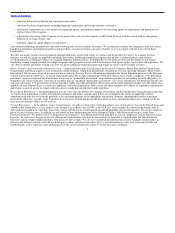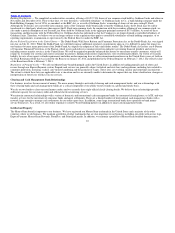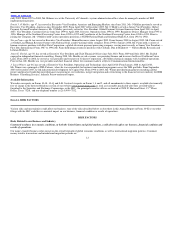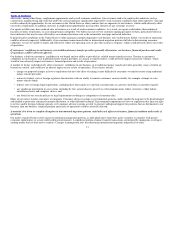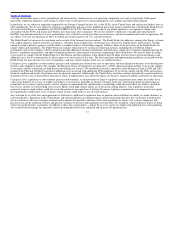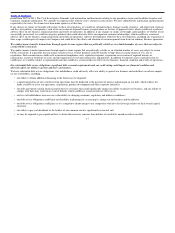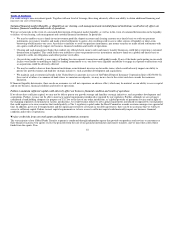MoneyGram 2011 Annual Report Download - page 10
Download and view the complete annual report
Please find page 10 of the 2011 MoneyGram annual report below. You can navigate through the pages in the report by either clicking on the pages listed below, or by using the keyword search tool below to find specific information within the annual report.
Table of Contents
• consumer information gathering and reporting requirements;
• consumer disclosure requirements, including language requirements and foreign currency restrictions;
• notification requirements as to the identity of contracting agents, governmental approval of contracting agents or requirements and limitations on
contract terms with our agents;
• registration or licensing of the Company or our agents with a state or federal agency in the United States or with the central bank or other proper
authority in a foreign country; and
• minimum capital or capital adequacy requirements.
Anti−money laundering regulations are constantly evolving and vary from country to country. We continuously monitor our compliance with anti−money
laundering regulations and implement policies and procedures to make our business practices flexible, so we can comply with the most current legal
requirements.
We offer our money transfer services primarily through third−party agents with whom we contract and do not directly control. As a money services
business, we and our agents are required to establish anti−money laundering compliance programs that include: (i) internal policies and controls;
(ii) designation of a compliance officer; (iii) ongoing employee training and (iv) an independent review function. We have developed an anti−money
laundering training manual available in multiple languages and a program to assist with the education of our agents on the various rules and regulations. We
also offer in−person and online training as part of our agent compliance training program and engage in various agent oversight activities.
Money Transfer and Payment Instrument Licensing — Almost all states in the United States, the District of Columbia, Puerto Rico and the United States
Virgin Islands and Guam require us to be licensed to conduct business within their jurisdictions. Our primary overseas operating subsidiary, MoneyGram
International Ltd, became a licensed payment institution under the Payment Services Regulations adopted in the United Kingdom pursuant to the European
Union Payment Services Directive. Licensing requirements generally include minimum net worth, provision of surety bonds, compliance with operational
procedures, agent oversight and the maintenance of reserves or “permissible investments” in an amount equivalent to outstanding payment obligations, as
defined by our various regulators. The types of securities that are considered “permissible investments” vary across jurisdictions, but generally include cash
and cash equivalents, U.S. government securities and other highly rated debt instruments. Most states and our other regulators require us to file reports on a
quarterly or more frequent basis to verify our compliance with their requirements. Many states and other regulators also subject us to periodic examinations
and require us and our agents to comply with anti−money laundering and other laws and regulations.
Escheatment Regulations — Unclaimed property laws of every state, the District of Columbia, Puerto Rico and the United States Virgin Islands require that
we track certain information on all of our payment instruments and money transfers and, if they are unclaimed at the end of an applicable statutory
abandonment period, that we remit the proceeds of the unclaimed property to the appropriate jurisdiction. Statutory abandonment periods for payment
instruments and money transfers range from three to seven years. Certain foreign jurisdictions also may have unclaimed property laws, though we do not
have material amounts subject to any such law.
Privacy Regulations — In the ordinary course of our business, we collect certain types of data that subject us to certain privacy laws in the United States and
abroad. In the United States, we are subject to the Gramm−Leach−Bliley Act of 1999, or the GLB Act, which requires that financial institutions have in
place policies regarding the collection, processing, storage and disclosure of information considered nonpublic personal information. We are also subject to
privacy laws of various states. In addition, we are subject to laws adopted pursuant to the European Union’s Data Protection Directive, or the Data
Protection Directive. We abide by the U.S. Department of Commerce’s Safe Harbor framework principles to assist in compliance with the Data Protection
Directive. In some cases, the privacy laws of a European Union member state may be more restrictive than what is required under the Data Protection
Directive and may impose additional duties with which we must comply. We also have confidentiality/information security standards and procedures in
place for our business activities and with our third−party vendors and service providers. Privacy and information security laws, both domestically and
internationally, evolve regularly, and conflicting laws in the various jurisdictions where we do business pose challenges.
9

